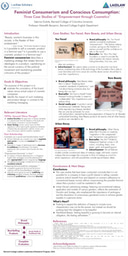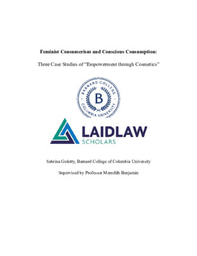Laidlaw Research: Sources & New Ideas
In my six weeks of research for the Laidlaw Scholars Program, I have had the chance to fully investigate questions that I feel are major cornerstones of thought for women's studies. How have cosmetics brands in the past decade incorporated feminist ideas into marketing efforts? What are the different feminist concepts involved in various advertisements, and how is their inclusion meant to impact the audience? What possible implications could this have on women’s consumption choices? What are the possible implications on a woman’s psyche or self-image?
Two sources I have interacted with in my research have significantly impacted and intrigued me in my work: the 1997 study Cosmetics Consumption and Use among Women: Ritualized Activities that Construct and Transform the Self and the 2008 article Feminist Consumerism and Fat Activists: A Comparative Study of Grassroots Activism and the Dove Real Beauty Campaign.
Cosmetics Consumption investigates cosmetic usage as a way to negotiate power in a society that expects particular standards of beauty; these ritualistic actions serve many functions for women: a way to privately construct aspects of their physicality, a common practice that establishes a recognizable public identity, and most interestingly, a tool for "exerting power" on the "gendered social order." The study noted that teenage girls that were shown pictures of women that met the beauty ideal felt more negatively about their own physical appearance immediately afterwards.
In Feminist Consumerism and Fat Activists, I found a striking precursor to the research I hope to conduct on cosmetics brands in their relation to various feminist "ideas," rather than Johnston et. al's comparison of grassroots fat activists versus the Dove "Real Beauty" campaign. To respond to Greta Gerwig's defense of her feminist oddball (yet highly merchandised) film Barbie, is it truly possible to "do the thing" and simultaneously "subvert the thing"? Can a corporation really encourage women positively, whether it's telling young girls to love themselves or working professionals to feel confident at work, while still encouraging constant consumption of product? This study is a major model for my research methodologies and patterns of thought, and I think of my current research as an extension and revisiting of the research conducted in this study.
In all, I am very excited to continue diving deep into these sources, and I'm highly looking forward to sharing my research once completed!


Please sign in
If you are a registered user on Laidlaw Scholars Network, please sign in